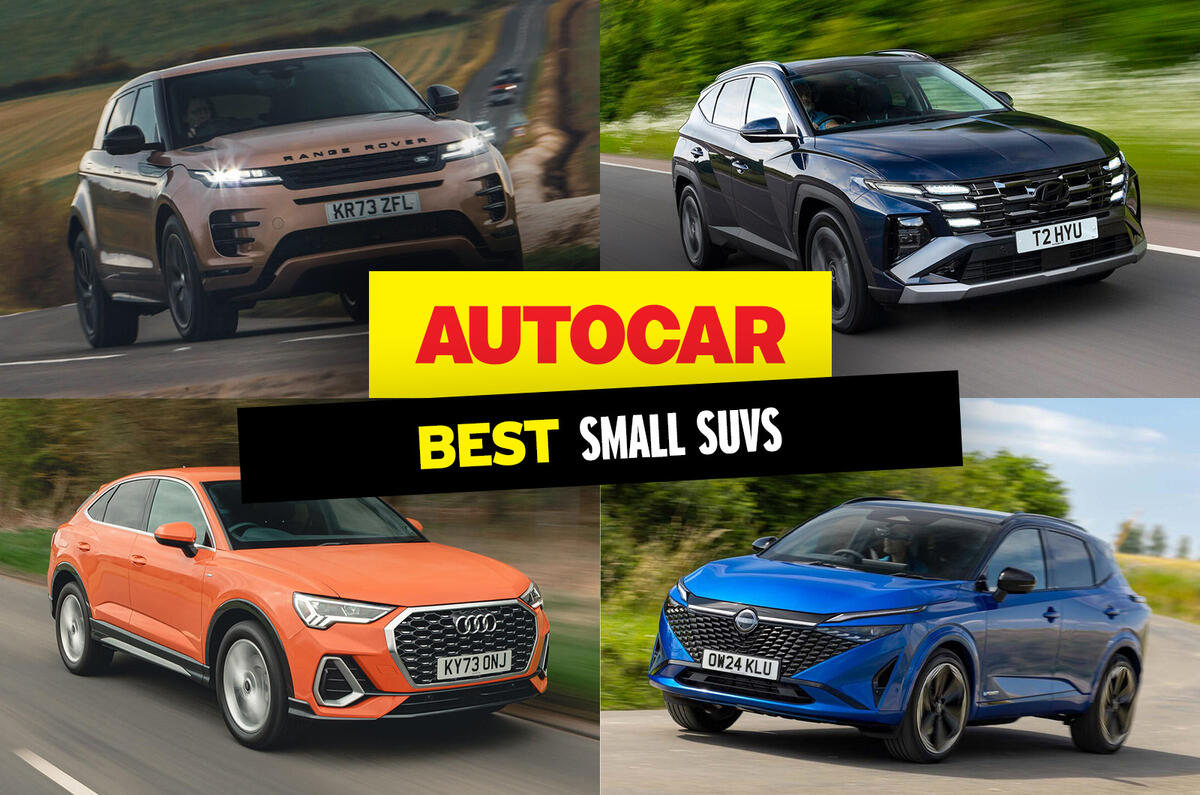The best small SUVs – driven, tested and ranked
The UK car market is awash with high-riding small SUVs. These are our picks
News


by Jack Warrick and Murray Scullion
8 mins read
5 February 2025
Share
Small SUVs are becoming increasingly common. In fact, they often dominate the UK’s best-selling cars charts.
The appeal? A commanding view of the road ahead, high levels of space and all the SUV looks – without the heft – or indeed cost – of traditional full-size Chelsea tractors.
Cars such as the Nissan Juke pioneered this class. But today it’s the Dacia Duster that leads the way. We rate it highly for space, value for money and for off-roading ability.
Below you’ll find our considered list featuring the creme de la creme of this segment. Each car has been rated by our reviewers, who have collectively driven every new car on sale today.
1. Dacia Duster
9
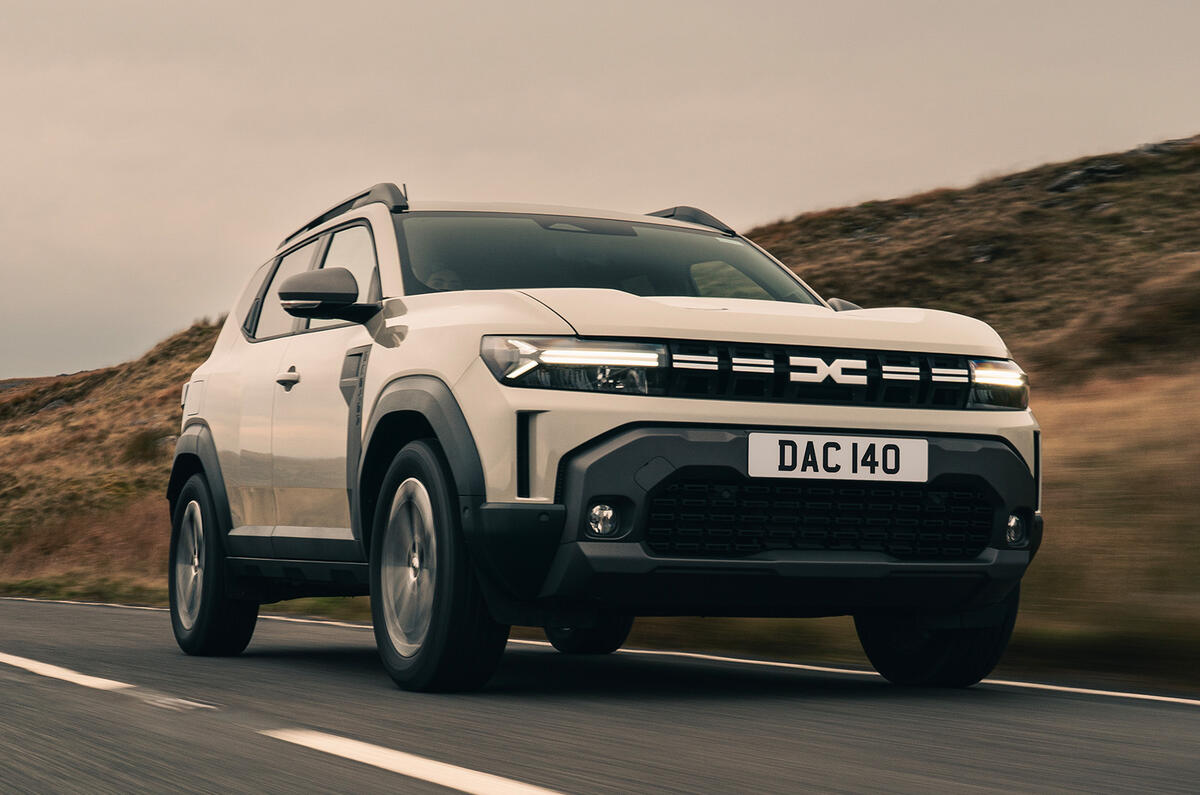
- Design9
- Interior6
- Performance7
- Ride & Handling7
- Costs10
Pros
Great value
Pleasant to drive
4×4 version has genuine off-road ability
Cons
Interior a little fussy
Feels cheap in places
Low Euro NCAP score
Best for: Value for money
Some say the Dacia Duster is all the car you need and who are we to argue? Spacious and large, it has been much improved over the past few generations.
Dacia’s budget-friendly crossover is now more refined, more drivable, more efficient than ever
Its interior is large and practical enough to be classed as a family SUV, while the ride is soft and plush. It can even be used off-road.
The Duster offers a choice of three engines: a 1.0-litre bi-fuel triple, which runs on petrol and LPG, a 1.2-litre mild hybrid and a 1.6-litre full hybrid.
We would choose the 1.2-litre, and view the hybrid as an automatic option that doesn’t carry a fuel economy penalty.
Ultimately, the Duster is at least as good as a Hyundai Kona while costing a few thousand pounds less. And that’s hard to argue with.
Read our Dacia Duster review
Save money on a Dacia Duster with What Car?
Finance this car with Drivenfi
Latest Reviews

Used Porsche Panamera 2016-2023 review
10
Used Porsche Panamera 2016-2023 review

Renault 4

Land Rover Discovery Sport
7

Porsche Panamera Turbo E-Hybrid and Turbo S E-Hybrid
10
Porsche Panamera Turbo E-Hybrid and Turbo S E-Hybrid

Toyota Prius
8
Read our review
Car review

Volvo XC40
Volvo’s XC40 arrives in the crowded premium compact SUV segment and hits the right note with design, practicality and driving style
Back to top
2. Nissan Qashqai
8
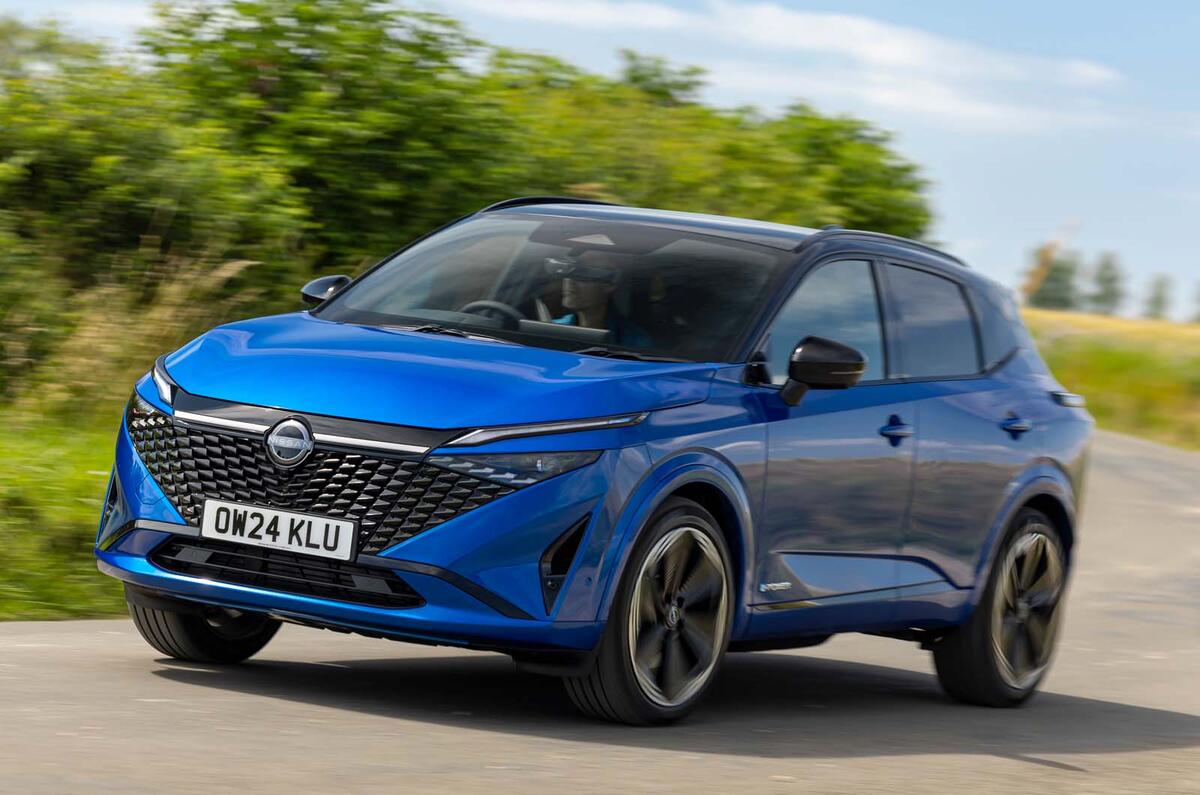
- Design7
- Interior8
- Performance7
- Ride & Handling8
- Costs9
Pros
Likeable interior
Comfortable in all scenarios
Infotainment is easy to use
Cons
Manual gearbox is hard work
CVT can lead to ‘mooing’
Infotainment feels dated
Best for: All-round ability
Right up until the end of its lifecycle, the old Qashqai stayed doggedly at the sharp end of the sales charts in this class, and so with its new, lighter chassis, more commodious dimensions and much-improved dynamics, you’d expect this new third-generation model to hit the ground running. And for the most part, it does.
The Qashqai remains true to the safe, predictable and rational formula of the models released before it
There’s little here for keen drivers, and both the 1.3-litre mild-hybrid petrol and novel e-Power hybrid are a little breathless, but what did you expect?
Performance and handling aren’t what the Qashqai is about and, as one tester put it, “it’s very thoughtfully designed for families, well equipped and costs peanuts to buy and run”. If you must have a two-pedal version, we’d go for the hybrid, rather than the wheezy CVT petrol.
The interior doesn’t look as jazzy as some, but the materials are pleasing, it’s solidly built and it’s very easy to use, thanks to plenty of real buttons.
All early Qashqais had a multimedia system that was easy enough to use but looked slightly dated. About two years in, higher trims got a new system that retains all the usability but looks a lot nicer.
A game-changing effort? Not any more, but it’s a demonstration that Nissan knows its customers extremely well. It’s difficult to beat among the non-premium ranks.
Read our Nissan Qashqai review
Save money on a Nissan Qashqai with What Car?
Finance this car with Drivenfi
3. Volvo XC40
8
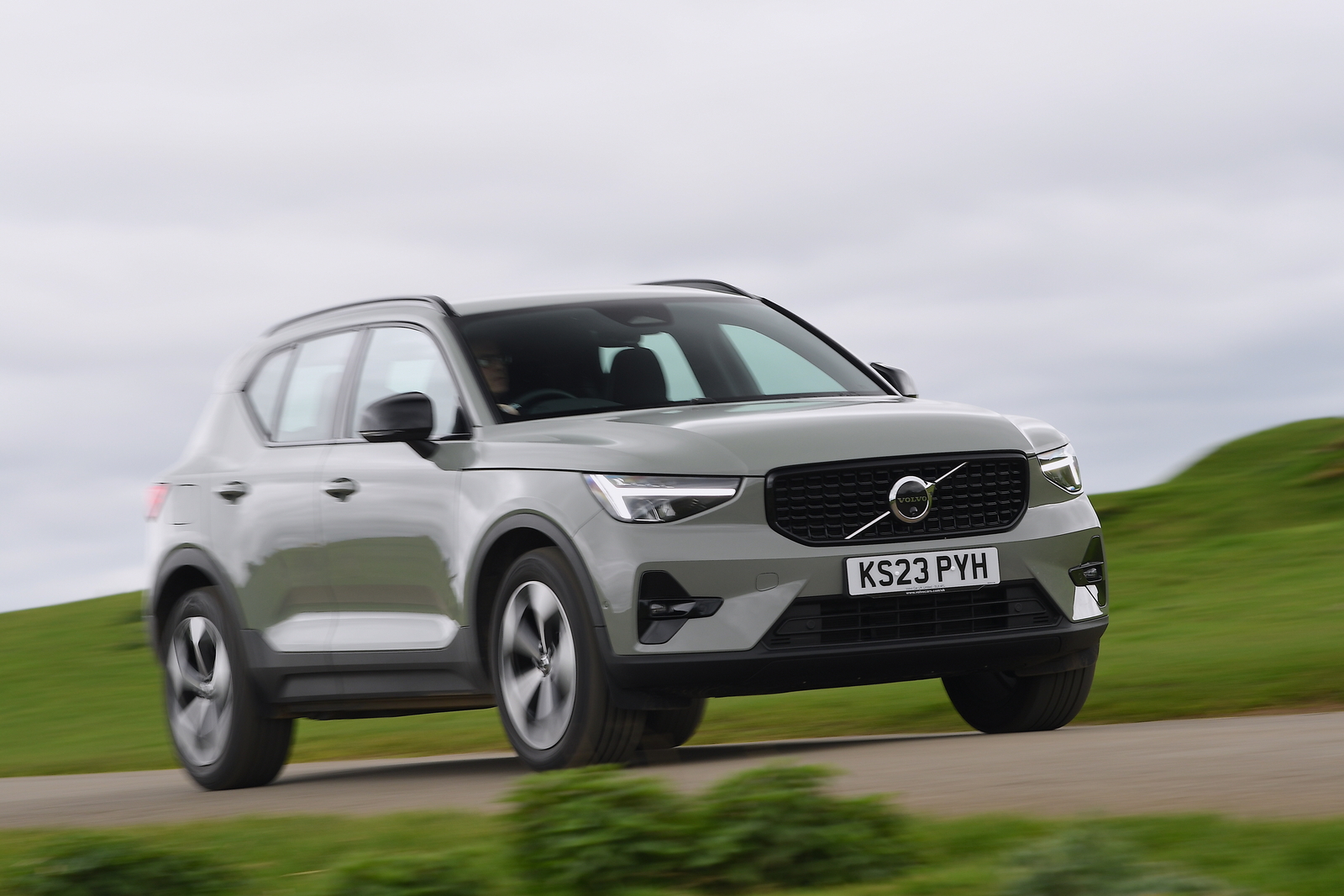
- Design8
- Interior7
- Performance7
- Ride & Handling8
- Costs7
Pros
Wide range of engine options
Interior ambience
Blend of ride and handling
Cons
Only so-so to drive
Not as spacious as some
Petrol engines can sound coarse
Best for: Luxury feel
The Volvo XC40, the Swedish car maker’s compact sibling for its established XC60 and XC90 SUVs, has been a real success.
In its pragmatic, comfort-orientated, functionality-focused way, it is a classic Volvo to its core
It’s a model that offered instant kerbside appeal when it launched back in 2017, with a charismatic and alluring design that helped bring younger family buyers into Volvo showrooms.
In addition to its funky exterior, the XC40 also offers a cabin of laudable richness, comfort, usability and quality.
While it isn’t the most practical car in the small SUV class, it certainly has plenty of luxury car ambience. Currently, the model is only offered with two mild-hybrid powertrains, but both are good options.
If an SUV’s mission is to lift its driver above the hustle and bustle and filter out the pain from the daily grind, few do it better than the Volvo XC40.
Read our Volvo XC40 review
Save money on a Volvo XC40 with What Car?
Finance this car with Drivenfi
Back to top
4. Audi Q3
8
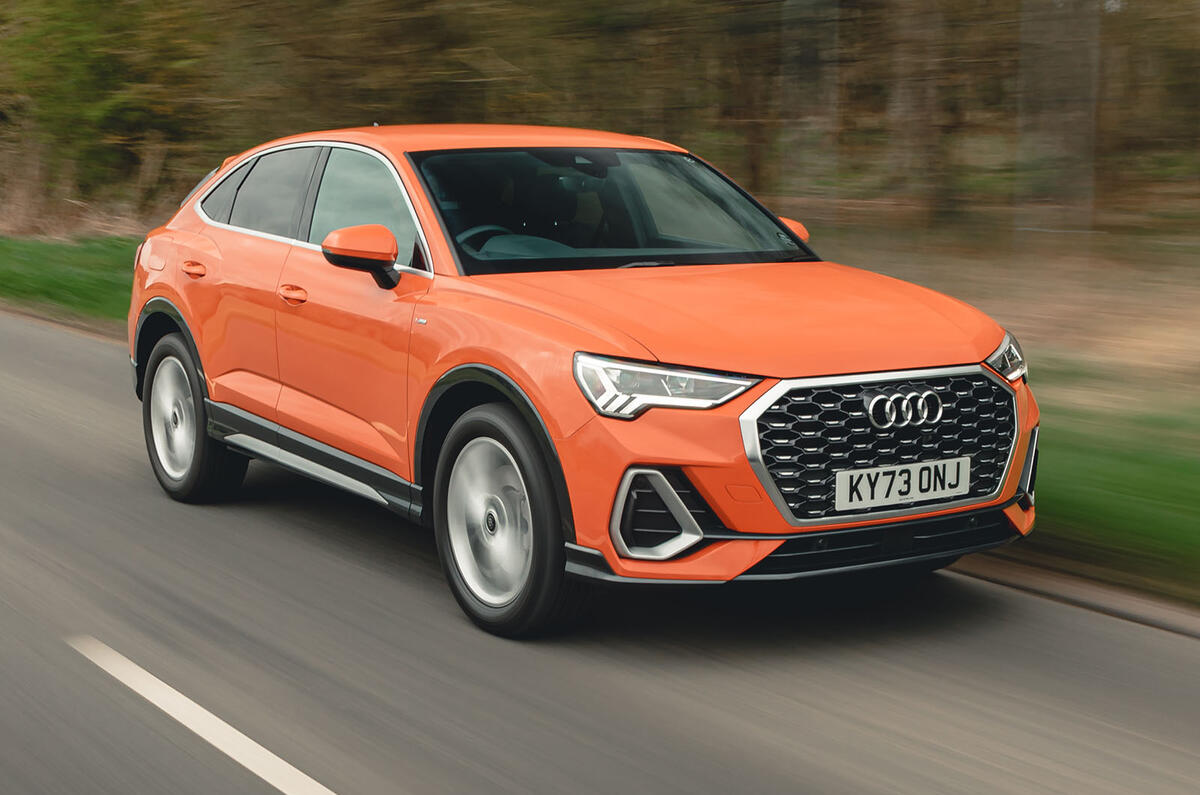
- Design9
- Interior8
- Performance7
- Ride & Handling7
- Costs7
Pros
PHEV is good value
Captures some of the appeal of larger Audi SUVs
Available in coupé form
Cons
Not as refined as you might expect
Interior quality
Noisy diesel engine
Best for: Range of powertrains
Audi’s Q3 is a stalwart of the class and comes with a good range of powertrains: petrol, diesel and plug-in hybrid.
This car has still got real-world strengths that might make it better to live with than key rivals
There’s also the option of the slope-backed Sportback body style, although you’re better off maximising interior space with the regular version.
The Q3 is in general a strong contender, with slick drivability and plenty of space, but there are some quirks to the line-up. For one thing, the PHEV is surprisingly good value. For another, rolling refinement isn’t always as strong as it might be.
The powertrains are well-mannered enough, but just make sure you don’t overdo it on the size of the wheels and ruin the ride. The latest versions are also lacking just a touch in terms of that bulletproof interior feel.
Read our Audi Q3 review
Save money on an Audi Q3 with What Car?
Finance this car with Drivenfi
5. Hyundai Tucson
8
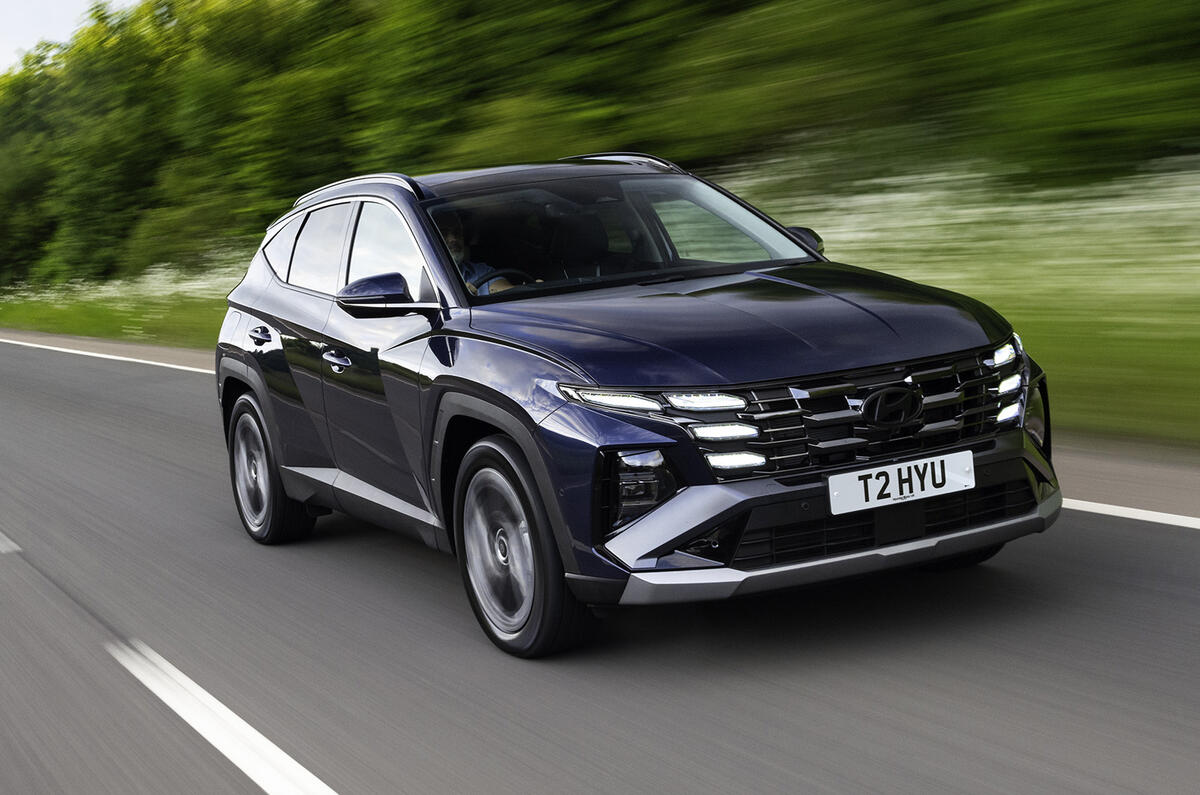
- Design7
- Interior8
- Performance8
- Ride & Handling7
- Costs8
Pros
Potentially very economical
Striking exterior design
Grown-up interior
Cons
Sluggish automatic gearbox
Lacklustre driving dynamics
Some cheap plastics to be found
Best for: Interior layout
The arrival of the fourth-generation Tucson was something of a watershed moment for Hyundai.
The Tucson shows that Hyundai can do both style and substance
Stylistically, it was a drastic departure from its handsome but slightly dull predecessors, and its cabin reaches new heights in terms of material appeal, too.
Hyundai has long been trying to rebrand itself as an upmarket contender in Europe, and the Tucson has helped move the firm much closer to the Germans.
Dynamically, it plays things pretty safe, with a handling balance that prioritises ease of use over out-and-out dynamism, but it’s still enjoyable enough to pedal down a twisty road.
More so than ever before, this is an impressively polished small SUV that’s absolutely worthy of your attention.
All of the Tucson’s powertrains are based around a turbocharged 1.6-litre four-cylinder petrol engine, with mild and plug-in hybrids available.
Read our Hyundai Tucson review
Save money on a Hyundai Tucson with What Car?
Finance this car with Drivenfi
Back to top
6. Mazda CX-5
7
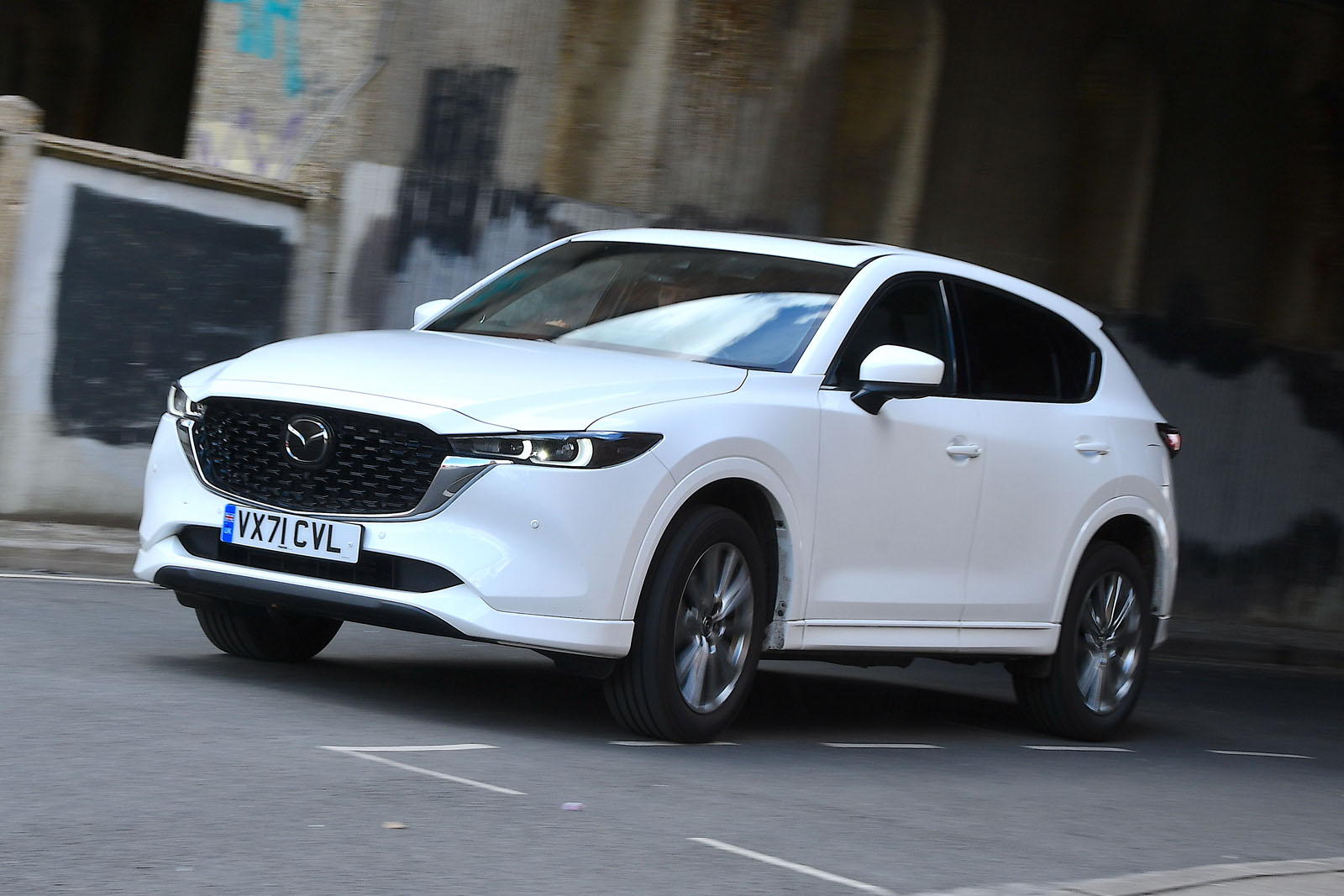
- Design7
- Interior7
- Performance7
- Ride & Handling7
- Costs7
Pros
Good to drive
Excellent interior
Comfortable over distance
Cons
Straight-line performance not always up to snuff
Can be loud at a cruise
Larger wheels give a firm ride
Best for: Diesel lovers
Like the XC40, the Mazda CX-5 is one of the senior citizens of this class, but it’s easily one of the best-looking SUVs on the market.
The sense of relative lightness and compactness, crispness, precision and simplicity make it great to drive
Also spacious and well-packaged, the CX-5 boasts a solid, stylish and beautifully made interior, with the sort of usability that many other car makers could learn from.
It can also hold its own for driving dynamics, with a handling pep that has made it one of our favourite small SUVs.
All CX-5 grades (trim levels) come with a choice of mild hybrid petrol engines, but the unfashionable 2.2-litre diesel is our top pick, limited to the top-spec Takumi model.
Overall, the CX-5 offers a healthy mix of fun, frugality and family-friendly space, so it deserves serious consideration from buyers who want a car that does a little bit of everything.
Read our Mazda CX-5 review
Save money on a Mazda CX-5 with What Car?
Finance this car with Drivenfi
7. Kia Sportage
7
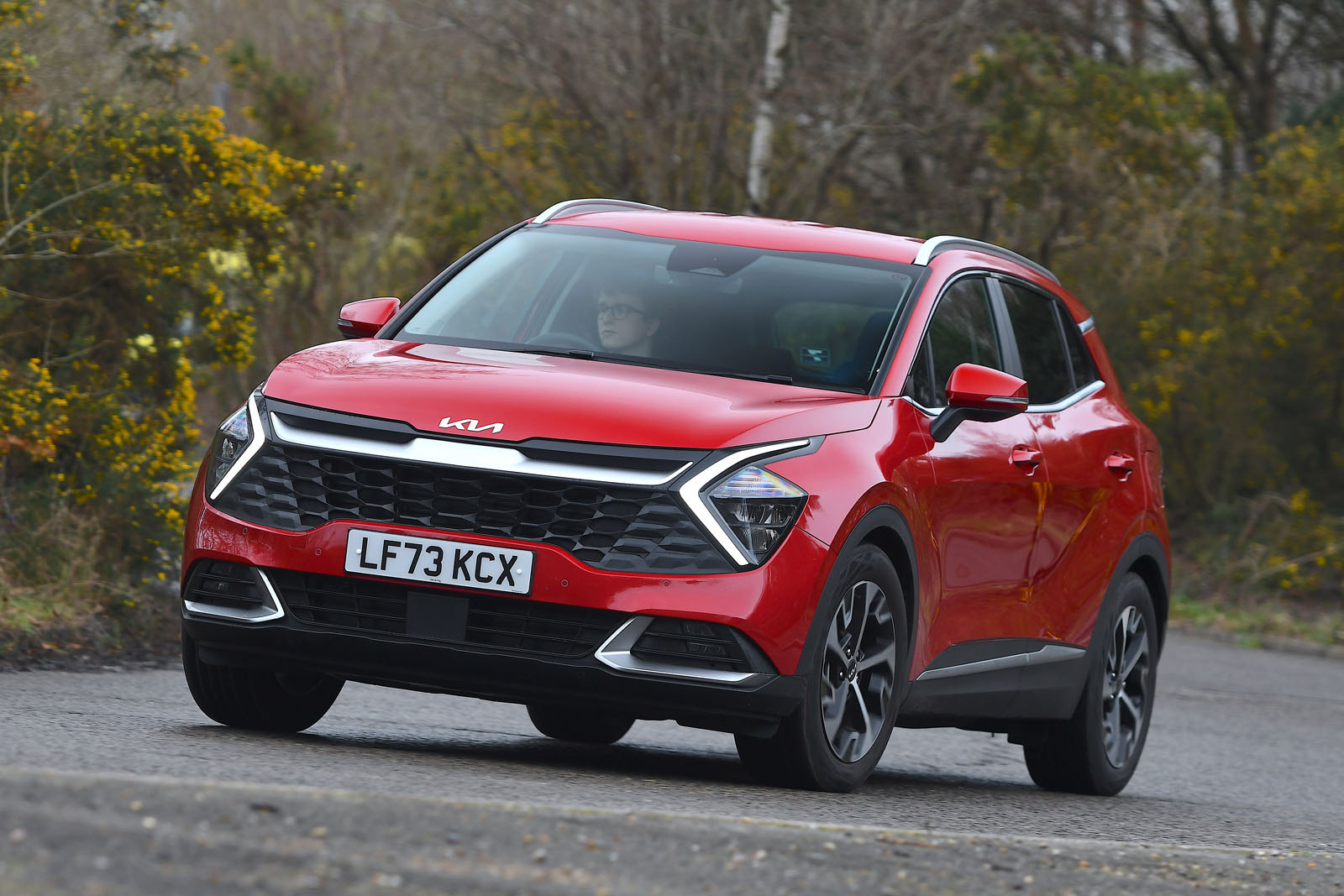
- Design8
- Interior8
- Performance7
- Ride & Handling6
- Costs7
Pros
Striking design
Neat and appealing interior
Broad range of engines
Cons
Hybrid powertrain can be coarse
Ride and handling balance isn’t that sweet
Head room on par with a hatchback
Best for: Hassle-free family life
The Kia Sportage is one of the UK’s best-selling cars and it’s easy to see why. Its design isn’t for everyone, but it’s a refined, grown-up and tech-laden package.
Spec advice? If you have taller passengers to think about, avoid the panoramic sunroof of the GT-Line and GT-Line S
It’s not quite as spacious as the best, but there’s enough room for most family needs, plus there’s a wide range of engines, from mild-hybrid petrols and diesels through to a BIK tax-busting plug-in hybrid.
It also comes loaded with standard kit, can be easily connected to your smartphone and is backed by Kia’s market-leading seven-year warranty.
To drive, the Sportage is something of a mixed bag. The handling is safe and predictable, but it’s fairly inert when you’re pressing on, while poorly surfaced roads quickly upset its composure. It’s reasonably refined but doesn’t ride as well as many rivals, jostling occupants over even smaller bumps.
Overall, the Sportage is a smart, well-equipped and hassle-free family SUV, but those wanting a little emotional uplift should look elsewhere.
Read our Kia Sportage review
Save money on a Kia Sportage with What Car?
Finance this car with Drivenfi
Back to top
8. Citroën C5 Aircross
7
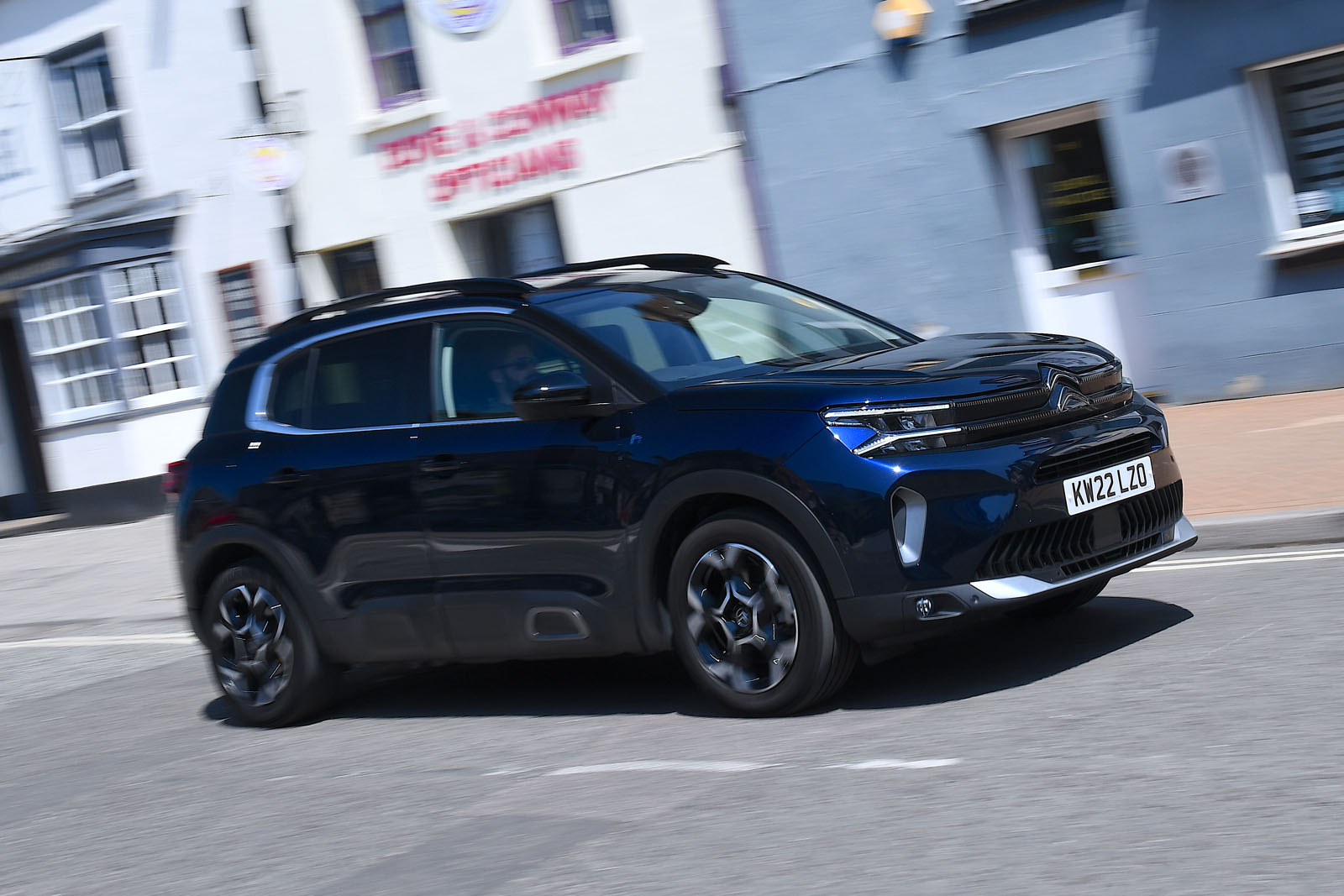
- Design6
- Interior7
- Performance7
- Ride & Handling9
- Costs8
Pros
Comfortable and spacious
Good value
Laid-back ride comfort
Cons
Clunky multimedia
Poor manual gearbox
Pretty slow by comparison
Best for: Ride comfort
It has taken Citroën’s entry to the small SUV class until middle age to feature in this list. Like a lot of Stellantis products, the C5 Aircross has wanted a really good engine – and now that’s exactly what it has received.
The simplified, affordable mild-hybrid version feels particularly Citroen
The familiar 1.2-litre three-cylinder has gained the help of an electric motor and has swapped its eight-speed automatic gearbox for a seven-speed dual-clutch unit.
If you’re tired of every car pretending to be sporty, the C5 Aircross is for you: soft, pillowy seats and pliant suspension combine to make quite a relaxing car. It’s roomy and decent value too.
The multimedia is quite clunky and around town, the ride can deteriorate. The entry-level manual is also vague, while the plug-in hybrid doesn’t have the punch its 221bhp promises.
Read our Citroën C5 Aircross review
Save money on a Citroën C5 Aircross with What Car?
Finance this car with Drivenfi
9. Range Rover Evoque
7
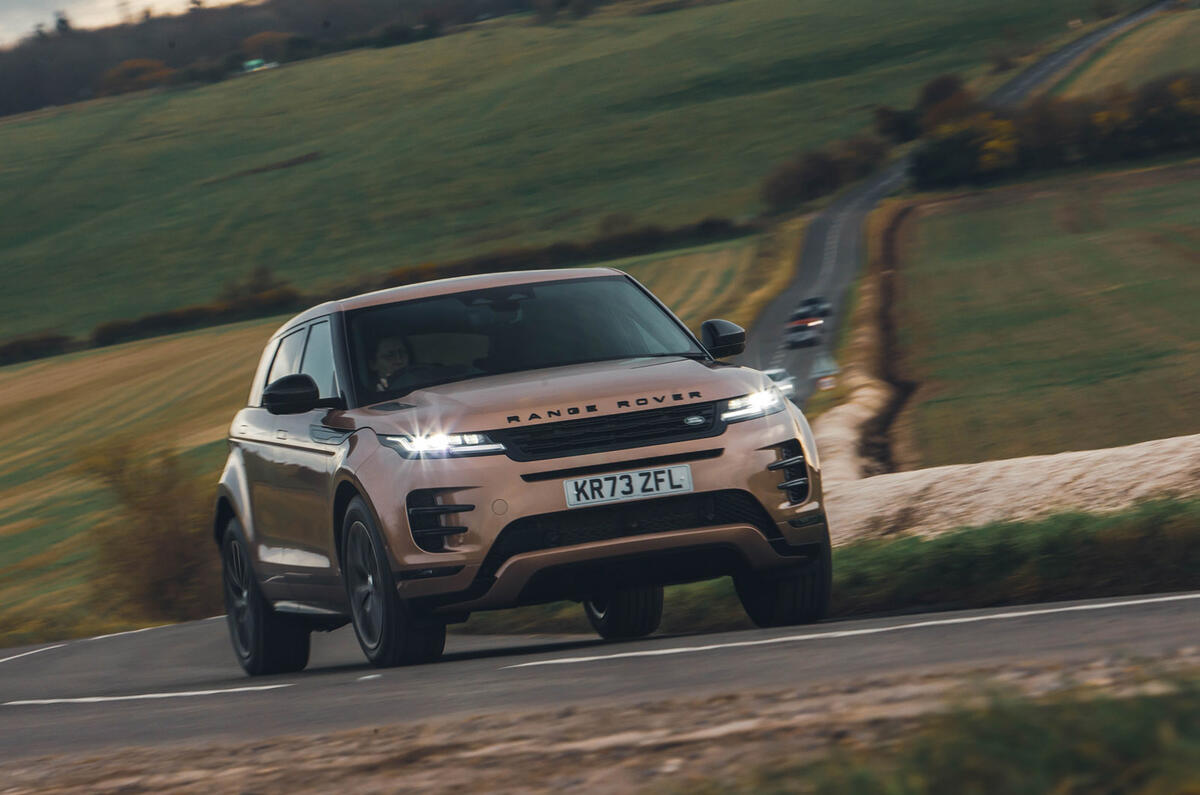
- Design9
- Interior8
- Performance8
- Ride & Handling7
- Costs6
Pros
Has taken sizeable steps on rolling refinement
Electrified powertrain has great performance and smoothness
It’s a heavy car but doesn’t handle or perform like one
Cons
It’s only a 33mpg car on the run when the battery’s flat
2024-model-year update has significantly cheapened the interior
Needlessly firm ride
Best for: Performance
The Range Rover Evoque was previously the best small SUV money could buy, and while it’s not quite as good as it once was, it’s still an option to add to your shortlist.
It looks great, handles with far more verve than most of its peers and the plug-in hybrid powertrain feels slick, responsive and ‘together’
Its design still looks the part, but its trump card is its handling. It’s more dynamic than the Qashqai and the Tucson – even in a plug-in hybrid form – and its powertrains are all slick and responsive.
The Evoque’s cabin still feels luxurious, but it’s let down hugely by its ride quality, which was needlessly firmed up as part of the model’s update, which it received in late 2023.
Its interior has also taken a hit, with the previous well-considered combination of physical buttons and a touchscreen replaced by a singular central touchscreen.
That said if you’re after a good small SUV, the Evoque is still a good option. It’s just more middle-of-the-road than a class leader.
Read our Range Rover Evoque review
Save money on a Range Rover Evoque with What Car?
Finance this car with Drivenfi
Back to top
10. BMW X1
7
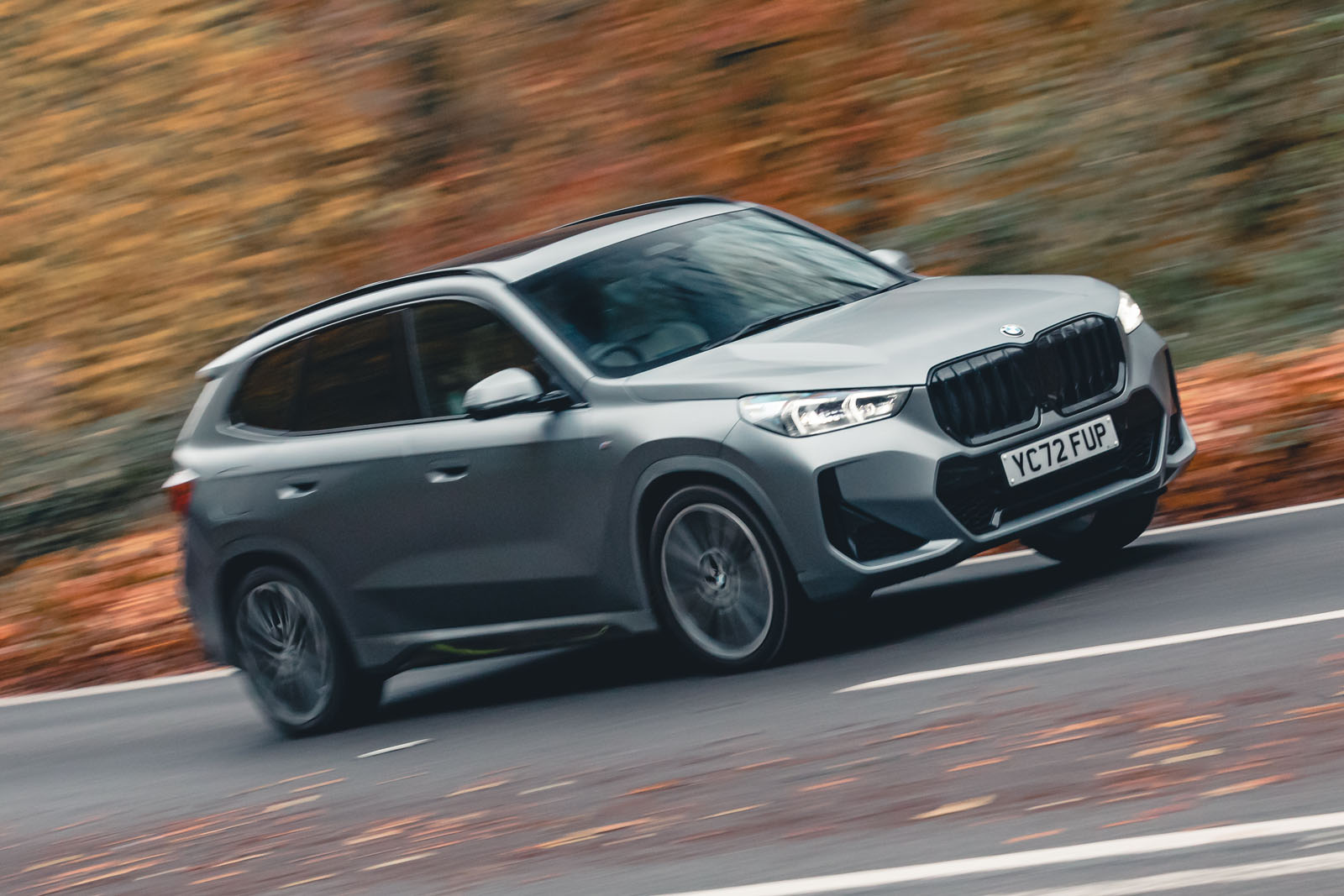
- Design8
- Interior8
- Performance7
- Ride & Handling8
- Costs6
Pros
Sky-high perceived quality
PHEV has good EV range
Quite roomy
Cons
Gearbox and steering aren’t up to BMW standards
Poor user interface
PHEVs are expensive
Best for: Interior quality
Like all of us, the BMW X1 has been getting larger as it gets older. In fact, the third-generation version, which made its debut in 2022, is now only a biscuit shorter than the original X3 – a car that’s theoretically in the class above. Still, this swelling is good news for those with growing families, because it means you can fit more people and things inside.
As a practical vehicle, the BMW X1 is surprisingly successful. It has class-leading boot space and rear leg room, and plenty of oddment storage
Built on the same UKL platform as the BMW 2 Series Active Tourer MPV, the X1 gets a wide range of engines, from mild-hybrid petrols and diesels through to a pair of plug-in hybrids and even an all-electric BMW iX1, complete with a handy official range of 272 miles.
Regardless of motive force, the X1 is a composed and capable steer but perhaps not the very embodiment of the ‘ultimate driving machine’ that BMW’s marketeers would have you believe.
There’s decent grip and body control, but the steering is mute and nervous unless you’re on the door handles – which isn’t the way that most people will drive their family bus. It also doesn’t ride well enough to excuse the lack of handling panache.
What will take the most getting used to, however, is the multimedia system. BMW has got rid of its signature rotary controller in cheaper models like the X1 – and with it, a lot of other physical buttons have migrated to the screen. That wouldn’t be such a problem if it were logical to use, but sadly it isn’t.



